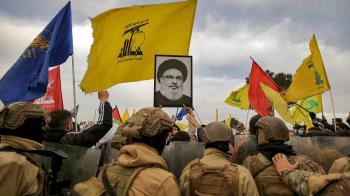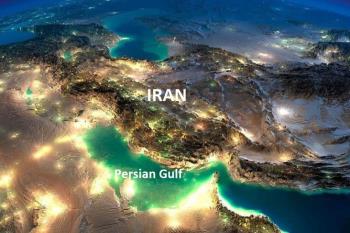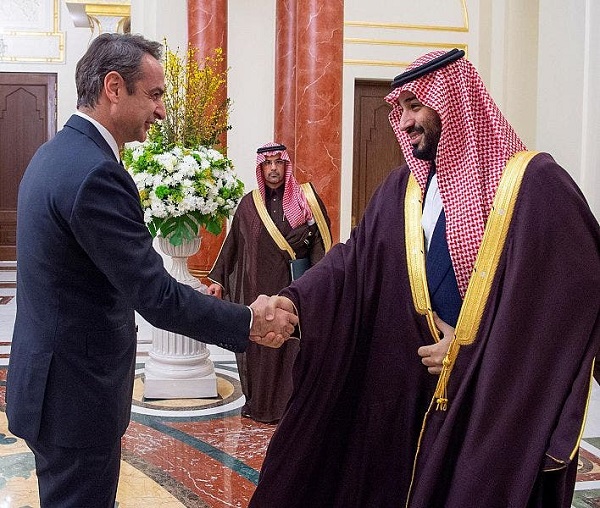Alwaght- On Monday, the Greek Prime Minister Kyriakos Mitsotakis visited Saudi Arabia and after meeting with the Saudi Crown Prince Mohammed bin Salman went to the United Arab Emirates where he met Abu Dhabi Crown Prince and Deputy Supreme Commander of the UAE Armed Forces Mohammed bin Zayed Al Nahyan. The visits by the Greek PM also was driven by a goal to test Athens's capability to put strains on Turkey using the Arab countries.
The Greek PM’s visits
Over the past two years, Greece has seen resurfacing of its historical and geopolitical challenges. Turkey and Libya’s Government of National Accord in late December signed two pacts allowing them to have oil, maritime, security cooperation. The pacts drew severe reaction from the Greek government. The Turkish-Libyan agreement was on the maritime borders between the two countries and also on developing bilateral security and military cooperation. The Israeli regime, Greece, Egypt, and Cyprus reacted to the agreement but the Greek reaction was strongest of all and that is because the maritime borders in the Mediterranean Sea are yet to be drawn between Athens and Ankara and the Turkish-Libyan demarcation will risk the Greek sovereignty on parts of its islands in the Mediterranean.
Reacting to the accord, Greece initially summoned the Libyan ambassador and then expelled him from the country. Greece does not have adequate military and economic power to pick a direct fight against Turkey in the current geopolitical crisis so it tries to pressure Ankara in political and security terms through building an alliance with Egypt and the Israeli regime, both of which are regional rivals and foes of the Turkish government. When the Turkish-Saudi relations frayed over Turkey's support to Qatar in the face of the Saudi-led blockade and also the Turkish insistence on pursuing the case of the assassination of the prominent Saudi journalist Jamal Khashoggi, Saudi Arabia has been struggling to get a toehold in the eastern Mediterranean for security encirclement of Turkey. On September 12, Ibrahim al-Assaf, then foreign minister of Saudi Arabia, visited Cyprus with which Turkey has a dispute over the northern Cyprus which has Turkish majority. Al-Assaf said that Riyadh backs the legitimacy and sovereignty of Cyprus. CNN called the Saudi diplomat’s comments and the visit “firing diplomatic missile” on the Turkish President Recep Tayyip Erdogan. Over the past few months, Greece and Saudi Arabia have been exploiting their close relations against Turkey.
The result of the PM’s visits
Greece focuses on the vulnerability of the Saudi oil facilities as the factor where the deal can start. Recently, media reports suggested that Greece is sending US-provided Patriot air defense batteries to Saudi Arabia to guard the “critical energy infrastructure.” This drags the PM under serious criticism at home. A Greek member of parliament criticized the PM for keeping the case covert. He said that some 300,000 missiles and other military facilities worth of €66 million was supposed to be sold to Saudi Arabia. “The question is that why the money has not come to the government treasury and second Saudi Arabia says it needs 100.000 missiles so where did the other 200,000 missiles go? And who got their money?” the lawmaker was quoted as saying. Some of the Greek media reported that the weapons deal has never materialized because the Arab kingdom failed to pay the money in due time.
The Greek government spokesman Stelios Petsas after the PM visit said that Greece has sent its Patriot batteries to Saudi Arabia to protect its oil facilities. Commenting on the goals of the PM’s visit, Petsas said that he discussed with the Saudi officials the geopolitical issues, the Turkish measures, and also the delivery of Patriot interceptors. Some of the Greek politicians have described the missile system delivery to the Arab monarchy as a “dangerous adventure.”
Mitsotakis visited Saudi Arabia along with his Minister of Investment and Development Adonis Georgiadis to attract Riyadh’s investment and thus pave the way for long-time Saudi presence in Greece and the eastern Mediterranean. Saudi Arabia, very possibly because of interest to continue its competition with Turkey in Greece very quietly, has dealt with the visit very conservatively as it declined to give it much focus.
The UAE has been less conservative, however. Abu Dhabi took part in air force drills in March last year. On Wednesday, bin Zayed gave the Greek PM a very warm welcome saying that the trip is taking place at a time of really high significance. During the meeting, the two emphasized on establishing joint committees to reach a strategic partnership in the future. They also discussed Libya. The UAE is aware of the Greek pressure on Turkey in Libya and is trying to take advantage of Greece for its interests in Libya.
Following the expulsion of the Libyan ambassador, Greek foreign minister visited Benghazi and met with Colonel Khalifa Haftar, the warlord leading a military campaign against the internationally-recognized, Turkish-backed Government of National Accord. Reports suggested that Haftar had secretly traveled to Greece to talk support from Athens leaders. The visit was confirmed by the ANA news agency of Greece.
Egypt’s presence near Greece in the Mediterranean will possibly play as an incentive for lightweight Saudi and Emirati support to Greece. Having in mind that both Turkey and Greece are NATO powers and Ankara has a more dominant power in the eastern Mediterranean, Riyadh and Abu Dhabi will find any military presence in that region risky and adventurous. Although Greece seeks to take political advantage of the visits to the two Arab countries against Turkey, the Greek PM’s insistence on gaining Arab support will turn Greece a game court for the two Arab monarchies.



























